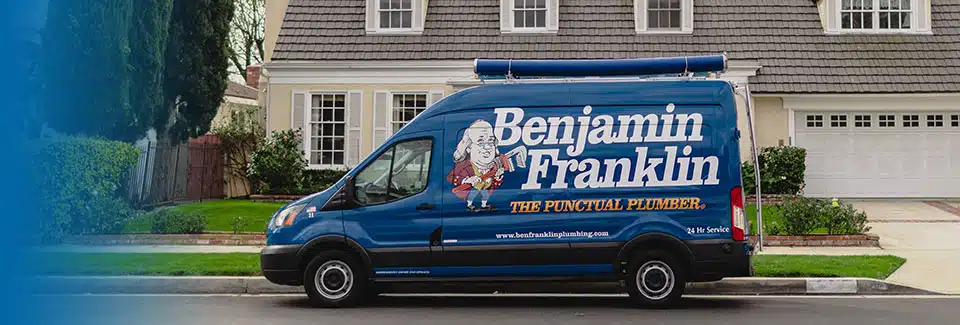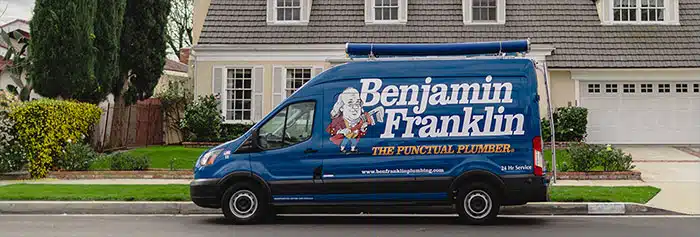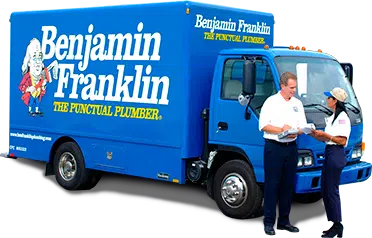A water heater keeps your home comfy, especially on chilly Arizona nights. If you notice water that’s too hot or too cold, odd noises, or higher energy bills, your unit might need a check-up. Simple upkeep like flushing the tank and checking the anode rod can help it last longer and work better.
Signs Your Water Heater Needs Fixing
A water heater doesn’t just fail overnight—there are usually warning signs.
Catching them early can save you from cold showers and costly repairs.
Water Temperature Keeps Changing
If your water goes from hot to cold without warning, your heater may be struggling.
This could be due to sediment buildup, a bad heating element, or a faulty thermostat.
If ignored, your system could stop working when you need it most.
Weird Noises from the Tank
Popping, banging, or rumbling sounds from your water heater aren’t normal.
These noises usually mean sediment is building up at the bottom of the tank, making it harder to heat water.
This forces the unit to work harder, which can lead to damage over time.
Higher Energy Bills
An inefficient unit can quietly raise your energy bills.
Water heating accounts for about 18% of a home’s energy use, second only to heating and cooling.
If your bill is going up for no clear reason, your system might be losing efficiency due to age or buildup.
Don’t wait until your water turns ice cold—if you notice these signs, call Benjamin Franklin Plumbing of Scottsdale, AZ for expert water heating inspection and repair.
Why a Reliable Water Heater Matters in Scottsdale, AZ
Scottsdale may have blazing summers, but winter nights can get pretty cold.
When temps drop, your unit works harder—sometimes 25% more than usual.
A good system means hot water on demand, so you’re not left with a freezing shower.
A reliable water heating system keeps things comfortable, saves energy, and boosts safety.
When it works right, it heats water fast and evenly, using less power.
This lowers your bills and helps your system last longer.
But skip maintenance, and you could face sudden breakdowns, high energy costs, or even water damage.
Getting regular checkups and tune-ups stops small problems from turning into big ones.
Simple steps like flushing out sediment, checking the anode rod, and adjusting the thermostat can help your unit last longer.
Scottsdale’s hard water wears down systems faster, so preventive care is key.
If your heater isn’t keeping up, don’t wait for it to fail.
The pros at Benjamin Franklin Plumbing of Phoenix, AZ can spot issues, suggest fixes, and keep your system running smooth, so you always have hot water when you need it.
Common Water Heater Problems Homeowners Face
Arizona’s climate, especially in Scottsdale, AZ, can be tough on a home’s heating system.
Over time, sediment from hard water builds up at the bottom of the tank.
This makes the unit less efficient and can increase energy use.
Too much buildup forces the heater to work harder, leading to overheating or early failure.
Rust and corrosion are also big problems.
If your hot water looks reddish, your tank or anode rod may be wearing down.
If left unchecked, this can cause leaks that damage your home.
Regular checks can catch rust early and help you avoid expensive replacements.
If your pilot light keeps going out or your hot water runs out fast, the ignition system might be failing.
A broken thermocouple or gas supply issue can leave you without hot water when you need it most.
Ignoring these problems could mean a sudden breakdown on a cold Scottsdale, AZ night.
Regular upkeep and fast repairs keep your water heating system working well, so you always have hot water.
If you’re dealing with any of these issues, Benjamin Franklin Plumbing of Phoenix, AZ is here to help.
Choosing the Right Water Heater for Your Home
Picking the right heater isn’t just about hot showers—it affects your energy use and costs over time.
Homeowners in Scottsdale, AZ should consider energy use, household size, and water demand before making a choice.
Tank vs. Tankless Models
Traditional storage units hold and heat a set amount of water, ensuring hot water is always available. However, they also lose energy in maintaining the temperature. They cost less upfront but run continuously.
On-demand systems heat water only when needed, reducing energy waste. They can be 24–34% more energy-efficient than storage models, helping lower utility bills.
Energy-Efficient Options
Want to save on bills and use less energy?
High-efficiency models use advanced technology to cut waste.
Look for units with a high UEF (Uniform Energy Factor) rating—they need less energy but still perform well.
Choosing the Right Size
Your unit size should match your household’s needs.
A large family may need a 50-gallon tank or a high-capacity on-demand system.
Smaller homes can use compact models.
The right size prevents running out of hot water and avoids wasting energy.
Why Regular Water Heater Maintenance Matters
Taking care of your water heater isn’t just about avoiding cold showers—it’s about keeping a key home appliance working well.
A well-maintained unit runs better, lasts longer, and prevents sudden breakdowns.
Make Your System Last Longer
If you don’t take care of your unit, it won’t last.
Regular upkeep can add years to its life, saving you from the cost of replacing it too soon.
Flushing the tank once a year clears out sediment that can cause damage and overheating.
In fact, flushing the system yearly can boost efficiency by 30%.
Lower Your Energy Bills
Sediment buildup makes the heating element work harder, wasting energy and raising your bills.
A clean and well-kept unit runs at its best, keeping energy use down.
Simple steps like checking the anode rod and adding insulation to water pipes help hold in heat and improve overall performance.
Avoid Expensive Repairs
Ignoring small issues, like a bad pressure relief valve or a worn-out anode rod, can lead to costly repairs.
Regular check-ups catch problems early so you don’t end up without hot water when you need it most.
Don’t wait for a breakdown—schedule maintenance with Benjamin Franklin Plumbing of Scottsdale, AZ to keep your water heater in top shape all year.
When to Repair vs. Replace Your Water Heater
Trying to decide whether to fix or replace your water heating system?
It mostly depends on age, performance, and overall functionality.
A well-kept unit lasts about 8-12 years, but if yours is getting old and having issues, replacing it might be the smarter move.
When a Repair Might Be Enough
If your unit is under eight years old and has small issues like a bad thermostat, a broken heating element, or a pilot light that won’t stay lit, a repair is usually the best fix.
These are common problems that a skilled plumber from Benjamin Franklin Plumbing of Scottsdale, AZ can handle fast.
When to Replace It
If your unit has constant breakdowns, rusty water, leaks, or high energy bills, it’s probably time for a new one.
Over time, sediment buildup and corrosion make older heaters less efficient and more likely to fail.
Upgrading can boost efficiency and improve performance.
Getting a New Water Heater
Newer models, like tankless systems, can be more efficient than traditional ones.
Whether you pick a standard or high-efficiency unit, choosing the right size for your home ensures steady hot water and optimal energy use.

How Scottsdale’s Climate Affects Water Heaters
Scottsdale’s desert heat and hard water take a toll on water heaters.
Arizona’s hard water, with 12-17 grains per gallon, causes mineral buildup, making these systems less efficient and shortening their life.
Without regular upkeep, sediment piles up, forcing the unit to work harder and wear out faster.
Seasonal changes add to the problem.
Summers are brutal, but winter lows average 44°F.
This colder water makes the unit work 25% harder, using more energy.
Without insulation and upkeep, heat loss in winter can lead to uneven temperatures and bigger energy bills.
To prevent issues, flush the tank yearly to clear out sediment.
Adding insulation to the system and pipes helps keep heat in and stress low.
If your unit is older, a water softener can reduce mineral buildup, helping it last longer.
For Scottsdale homeowners, regular maintenance prevents costly problems.
If your water heater struggles—showing uneven temperatures or rising energy use—Benjamin Franklin Plumbing of Phoenix, AZ can check your system and offer solutions built for the local climate.
Taking care of it now means reliable hot water when you need it.
Why Professional Water Heater Services Matter
A working water heater isn’t just a luxury—it’s a must.
Hiring a pro for installation, upkeep, and fixes makes sure your system runs safely and smoothly.
Why Expert Installation is Key
If a unit isn’t installed right, it can cause leaks, wasted energy, and even safety risks like gas leaks or electrical problems.
Pros know Scottsdale’s rules and can set up your equipment the right way so it works well and meets local codes.
Avoiding Costly Installation Mistakes
Mistakes like wrong pressure relief valve placement, poor venting, or bad connections can lead to big problems.
A pro makes sure your system is the right size for your home, helping you avoid wasted energy and frequent breakdowns.
Staying Up to Code
Scottsdale, AZ has strict rules on appliance placement, venting, and setup to keep things safe and efficient.
The licensed experts at Benjamin Franklin Plumbing of Phoenix, AZ know these rules inside and out, so you don’t have to worry about compliance.
Plus, setting your water heater thermostat to 120°F can cut energy costs by 3–5% compared to higher settings.
A pro can fine-tune these settings during routine check-ups, saving you money while making sure you always have hot water.
Energy-Efficient Water Heating Options
Upgrading to an energy-efficient heater can lower your utility bills while making sure you always have hot water.
The best system for you depends on your home’s needs and long-term savings.
Solar Heating Systems
Solar-based systems use Arizona’s strong sunlight to heat water at a lower cost.
These systems can cut water heating bills by 50–80% each year by using solar panels to absorb heat.
A backup unit ensures you still have hot water on cloudy days.
This setup gives you steady, eco-friendly hot water while reducing your need for traditional energy.
Gas vs. Electric: What’s More Efficient?
Gas-powered units heat water quickly and work well for big households.
If your home doesn’t have natural gas, a high-efficiency electric model can be a great option.
Both gas and electric models now come with better insulation, improved burners, and advanced heat exchangers, meaning less wasted energy.
Choose a unit with a high Energy Factor (EF) rating for the best efficiency.
Smart Tech for Better Performance
New water heating systems come with smart thermostats and Wi-Fi controls, so you can adjust settings from anywhere.
Some models even learn your habits and only heat water when needed.
This not only saves energy but also helps your system last longer.
An energy-efficient heater gives you reliable performance, lower bills, and a greener home—a smart choice for Scottsdale, AZ homeowners.
How to Make Your Water Heater Last Longer
Taking care of your heaters helps them last longer, work better, and lower the chance of sudden breakdowns.
A few simple steps can save you money and trouble over time.
Flush the Tank to Get Rid of Sediment
Over time, hard water sediment builds up at the bottom of your tank, making it less efficient and more likely to fail.
In this region, this buildup can cut efficiency by up to 50%.
Flushing the tank once a year clears out these deposits, helping your heater run better and use less energy.
Check the Anode Rod Often
The anode rod is a metal rod inside your heater that attracts rust-causing elements, keeping the tank from corroding.
Checking it every two to three years and replacing it when it’s too corroded can stop leaks and make your heater last longer.
Insulate the Unit to Save Energy
Water heating systems lose heat over time, which makes them work harder.
Wrapping the pipes with insulation can cut heat loss by 2°F–4°F, helping your heater run more efficiently and lowering your energy bill.
This can also help keep water hotter for longer, especially on chilly Arizona nights.
Regular maintenance helps prevent expensive repairs and keeps your water heater running smoothly all year.
If you’re unsure how to do these tasks, Benjamin Franklin Plumbing of Phoenix, AZ offers expert inspections and servicing to keep your system in great shape.
Choosing the Right Water Heater Service Provider
Picking the right water heater service provider can save you from headaches down the road.
Here are the key things to check before making a choice:
Proper Licensing and Certification
A good provider should have the right licenses and certifications to work in Arizona.
Licensed plumbers know local building codes and safety rules, making sure repairs and installs meet the right standards.
Hiring a certified provider lowers the risk of bad installs and faulty repairs.
Customer Reviews and Reputation
Online reviews can tell you a lot about a company’s reliability.
Look for a provider with strong reviews about being on time, skilled, and professional.
Focus on reviews that mention water heater repairs and installs, so you know they handle the service you need.
A trusted local company in Scottsdale, AZ is more likely to do great work.
Guarantees and Warranties
A reliable provider stands by their work with guarantees and warranties.
A good warranty on labor and parts means you won’t have to pay more if something goes wrong.
Companies that offer satisfaction guarantees show they care about quality and customer service.
If you go with a certified, well-reviewed, and warranty-backed provider, your system will be in good hands.

FAQs
How often should I flush my water heater?
Flush it once a year to clear out sediment. This helps it run better and last longer.
Why is my water heating system making a rumbling noise?
That rumbling sound comes from sediment at the bottom of the tank. It traps water, and as the burner heats up, air pockets pop. A professional flush can fix this.
Is it better to repair or replace my water heater?
If your unit is 8-12 years old and keeps breaking down, replacing it is often the better long-term solution. A new one will also use less energy.
What temperature should my water heater be set to?
120°F is best. It gives you hot water, lowers the risk of burns, and helps with energy efficiency compared to higher settings.
Does Scottsdale’s hard water affect my water heater?
Yes, Arizona’s hard water causes sediment to build up faster, making your system less efficient and wear out sooner. Regular flushing and checking the anode rod can help.






